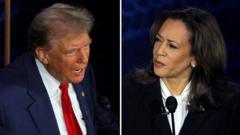Kimberly Pope Adams was an auditor working in Virginia when she was encouraged by Democratic state Senator Danica Roem to explore a career in politics. Roem suggested that Adams attend a six-month training program with Emerge, a national organization focused on preparing women for elected office. Adams found that the comprehensive training equipped her with valuable knowledge on campaign finance, media communication, and election strategy, saying it made her and her peers 'better women, better candidates.' After losing her initial election by a mere 53 votes, Adams is determined to run again this November, emphasizing the growing intentionality behind female Democratic candidates' efforts to gain political representation.
Debbie Walsh, director of The Center for American Women and Politics, noted the recent success of Democratic women, who now make up nearly equal numbers to their male counterparts in state legislatures, with numbers having climbed from just 34.1% in 2016 to today. In stark contrast, Republican women comprise only 21.3% of lawmakers, a sign that systemic barriers continue to hinder their representation.
Much of the progress made in recent years can be attributed to organized efforts to recruit and train women for office positions, sparked in part by the 2016 U.S. elections. Organizations like Emily’s List and Emerge have been pivotal in this movement, dedicated to supporting diverse candidates and addressing unique challenges that women face in the political arena.
This disparity in opportunity is noted among Republican women, where a lack of training and support programs fails to encourage more of them to take up political roles. Despite efforts like Republican Women for Progress, the resources available to train Republican women do not compare to those available for Democratic ones, leaving a significant gap in representation.
Both Adams and Walsh emphasize the importance of women’s voices in state politics, stating it fosters a richer and more representative leadership. As Adams continues her political journey, she draws strength from the connections formed through training, dubbing her fellow participants as 'sisters' in the pursuit of change.
Debbie Walsh, director of The Center for American Women and Politics, noted the recent success of Democratic women, who now make up nearly equal numbers to their male counterparts in state legislatures, with numbers having climbed from just 34.1% in 2016 to today. In stark contrast, Republican women comprise only 21.3% of lawmakers, a sign that systemic barriers continue to hinder their representation.
Much of the progress made in recent years can be attributed to organized efforts to recruit and train women for office positions, sparked in part by the 2016 U.S. elections. Organizations like Emily’s List and Emerge have been pivotal in this movement, dedicated to supporting diverse candidates and addressing unique challenges that women face in the political arena.
This disparity in opportunity is noted among Republican women, where a lack of training and support programs fails to encourage more of them to take up political roles. Despite efforts like Republican Women for Progress, the resources available to train Republican women do not compare to those available for Democratic ones, leaving a significant gap in representation.
Both Adams and Walsh emphasize the importance of women’s voices in state politics, stating it fosters a richer and more representative leadership. As Adams continues her political journey, she draws strength from the connections formed through training, dubbing her fellow participants as 'sisters' in the pursuit of change.

















